by Maria Luce Lupetti | Apr 25, 2018 | Uncategorized
“Things as Citizens”, by Louise Hugen is the first graduation thesis developed as part of PACT project. The project explored the possibilities of Things to be as citizens by means of a literature study, several creative sessions and a user test with a prototype of a Thing as citizen. The following article, authored by Louise Hugen, illustrates some highlights of the master thesis.
The aim of the thesis is to identify design qualities for intelligent things to perform appropriately during shared practices with citizens according to the urban culture in the city. The urban culture refers to the way that people behave in the city environment regarding the concept of citizenship and public behaviour.
In this context, things are connected artefacts that are able to connect to humans and non-humans via internet with data technologies. Therefore, things have a special proactive influence on humans as compared to other artefacts. It means that things become part of the city as active members. Therefore the project focuses on things as citizens by exploring the requirements for the coexistence of things and human citizens. The focus is on the notion of co-performance in the smart city: a concept that regards the practices of humans and things with agency to be equally important during shared practices.
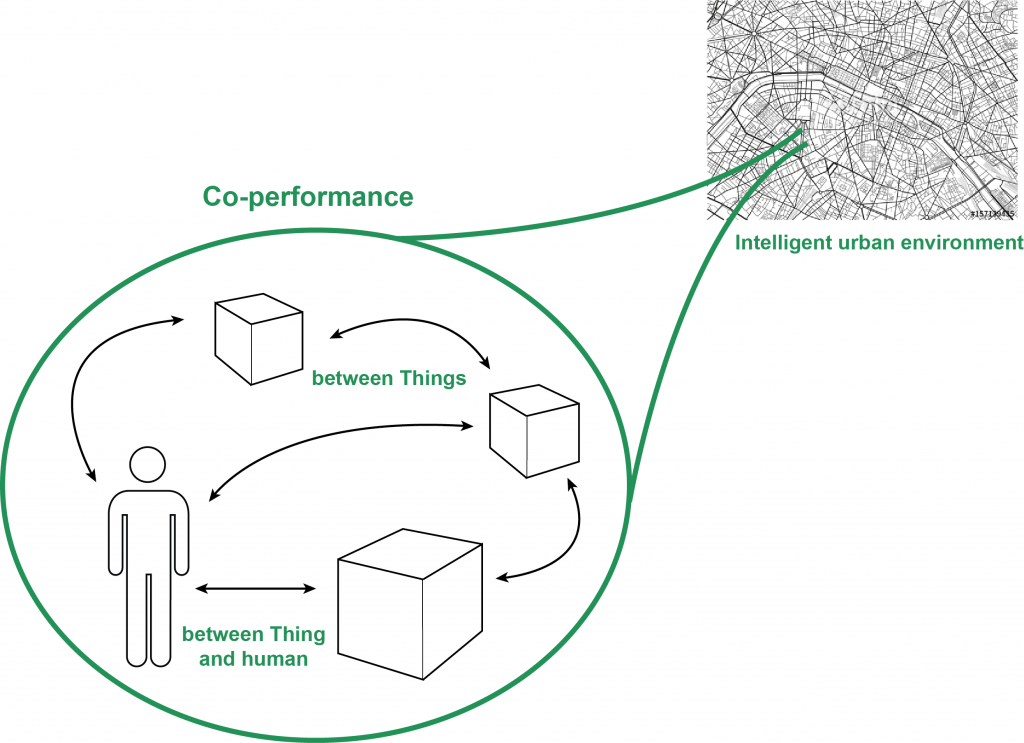
The research questions of the project are as follows:
- How should Things in the city co-perform with a human in a one-on-one interaction?
- How should a small system (~ 3 objects) of Things operate together in a city environment?
- What requires a Thing to act as a citizen according to the urban culture?
- What are the qualities for Things in the city based upon the results of the previous sub research questions?
A literature review on things and the notion of co-performance as well as practice based research with Dutch citizens are conducted: a creative session, contextmapping session and workshop at the yearly event Thingscon, an Internet of Things related conference. The studies showed that a democratic dialogue between citizens and things is needed in order to establish co-performance between both. It means that the behaviour of things should be adapted to the democratic values of society.
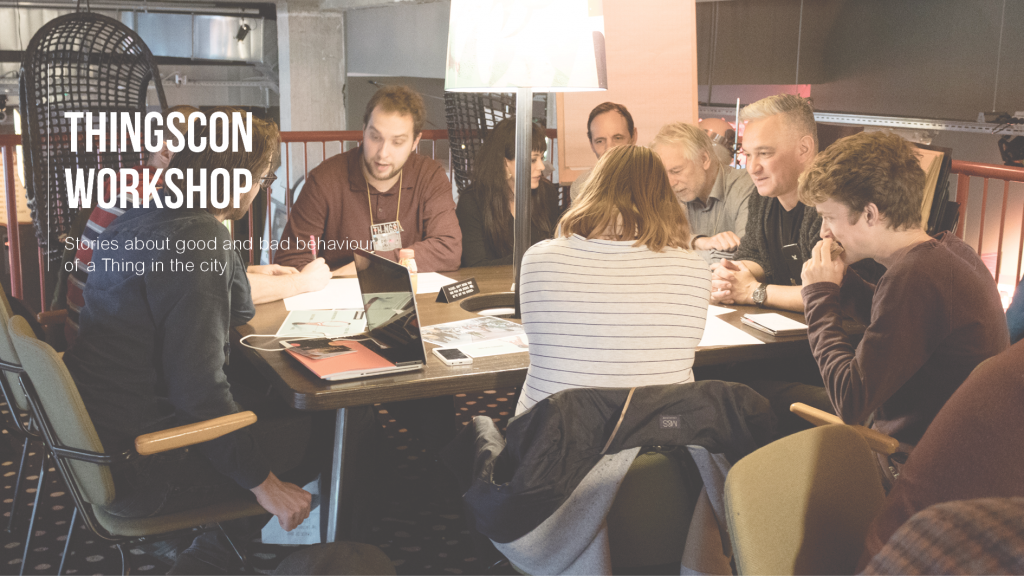
The design qualities that fit the vision of a democratic dialogue are identified by combining both the literature review and the outcomes of the practice based research into a synthesis. All design qualities are based on values for democratic citizenship: the right of truth, equality, privacy, participation and granted authority. The result is the design qualities model as can be seen in the following figure.

In order to evaluate and validate the design qualities, a concept of things in the city is developed that serves as a demonstrator for the theme Things as Citizens. The concept is designed in the context for air pollution and is a provider and distributor of clean air.
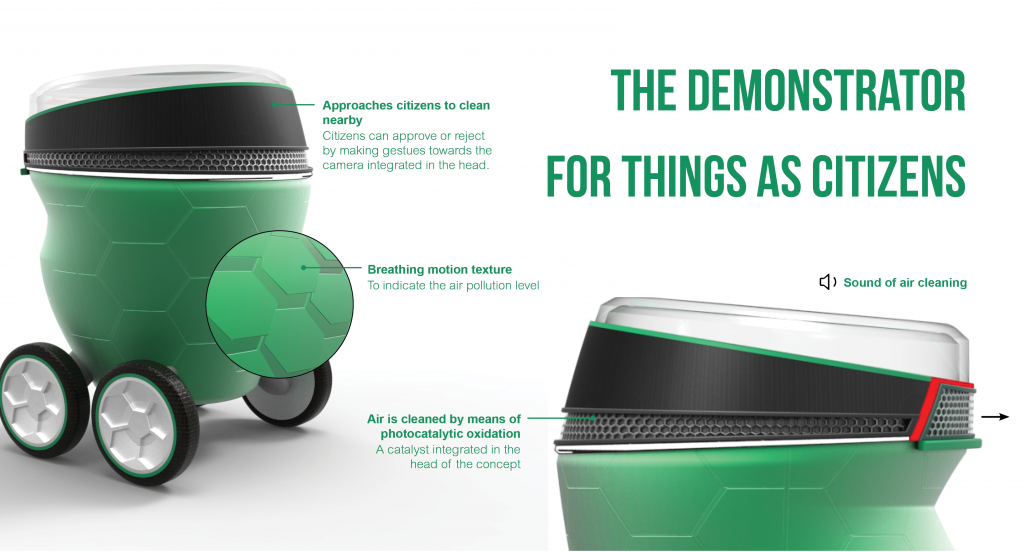
The implemented design cues of the concept represent the design qualities model. The visibility of these design qualities in the concept is validated by a qualitative study demonstrating to Dutch citizens the interaction with a physical prototype of the concept.
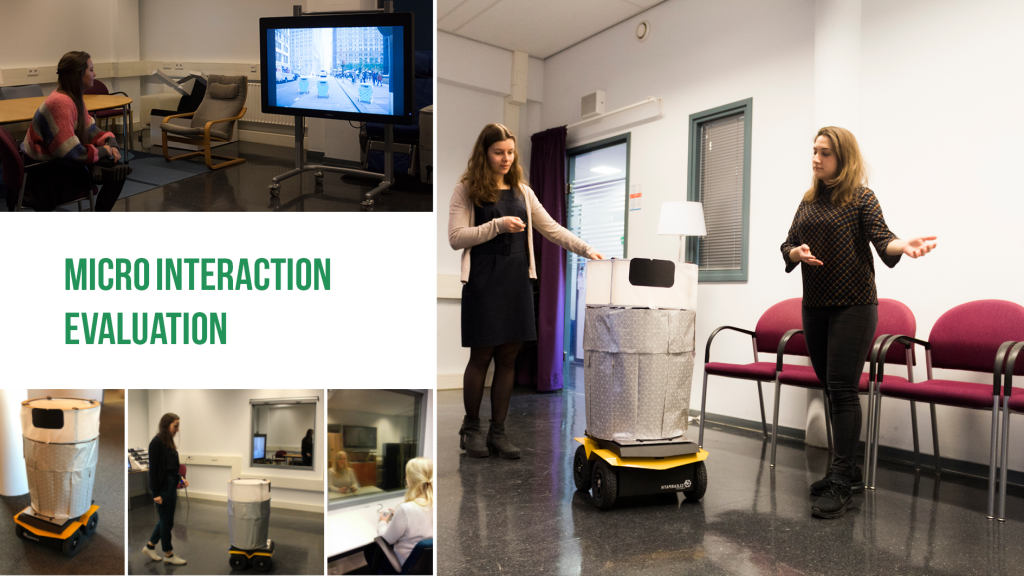
by Maria Luce Lupetti | Apr 9, 2018 | Uncategorized
On April 6th 2018, PACT conducted an ideation workshop on autonomous bike for future smart cities, as part of a master project in collaboration with the Amsterdam University of Applied Sciences.
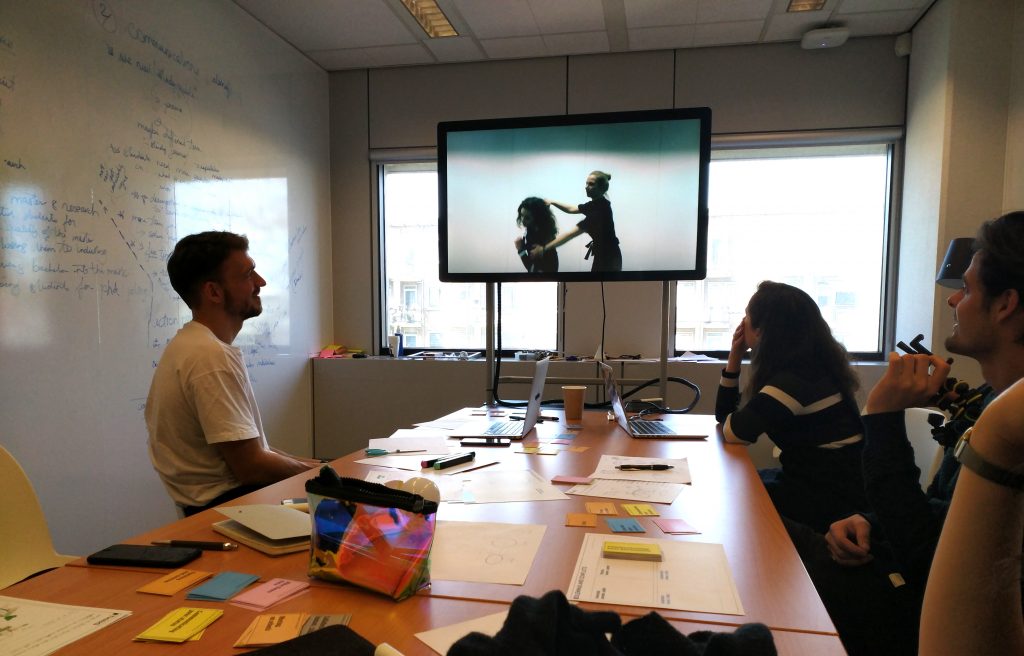
More details about the workshop results can be found here.
by Maria Luce Lupetti | Apr 6, 2018 | Uncategorized
Things as citizens – Designing autonomous and self-aware bicycles
Cities are becoming smarter. Sensors are embedded on objects such as traffic lights or park benches; the data generated by the user of the city are combined and analyzed to optimize the use of the city in all kind of ways, offering new products and services.
Project PACT argues that there will be a next iteration of the smart city as soon as the things become more intelligent through artificial intelligence and machine learning. Things will become self-aware and have agency. The things will be citizens too in the intelligent city. Not only will we see new interfaces with services as the dialogues become more dominant paradigm, the whole system of the things in the city will change. When we understand the potential relation between people and intelligent things, we are better able to live with them. Designers will have an important role in shaping this future society.
For designers this triggers all kind of questions. What is the rule set we need to design for these things? And what is the relation between things and humans in these smart cities? In this project, we would like to dive deep into the future of these new cities and make a demonstrator of one particular thing, a bike that behaves as a citizen.

Processed with VSCO with a6 preset
Design challenge
Imagine a bike that is riding itself based on a target that is given. The bike is intelligent and takes the best route. The intelligence is so far developed that the bike can react on its user and direct context, and combine this with the knowledge of all other members of traffic. At the same time, the cyclist should be informed on the (expected) behavior of the bicycle to deliver a comfortable ride. This is of course a hypothetical product, but it could happen. We would like to get insights in the possible interfaces. To keep it focused, we frame the context towards an area of 50 x 50 x 5 meter on the crossing Wibautstraat/Mauritskade.
The embodiment of intelligence in the bike leads to its own will and actions. Within that space, every solution is possible to achieve an interaction between bike and rider. Steer, pedals, bike, saddle, or whatever you can think of can become touchpoints for interaction, and visual, touch or audio or anything else can be used as cues for interaction. Next to the interface, we also think it is interesting to design the relation between the thing and the human, i.e., who is in charge/when and what is the communication style.
by Maria Luce Lupetti | Mar 28, 2018 | Uncategorized
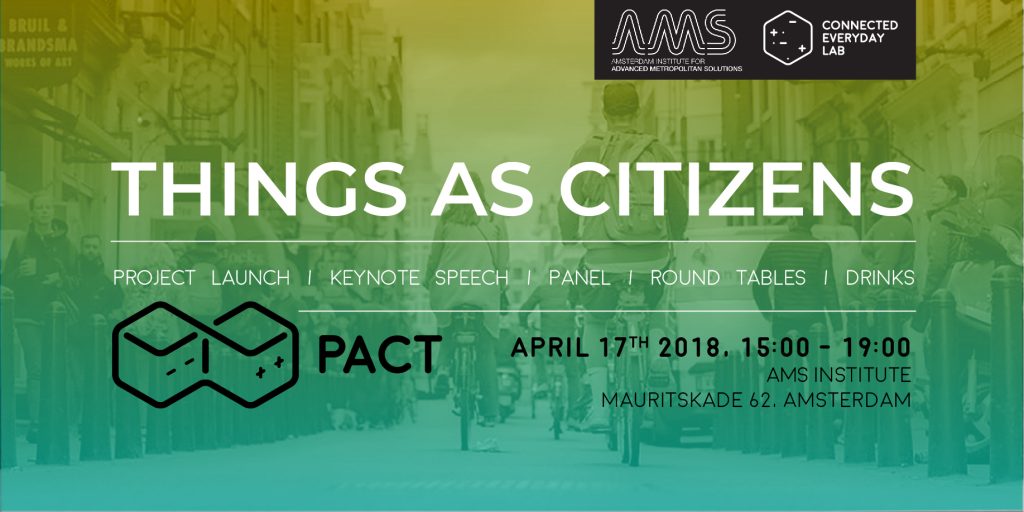
PACT research program, together with AMS (Amsterdam Institute for Advanced Metropolitan Solutions), is launching the project “Things as Citizens” with a kick-off event on April 17th.
The project is dedicated to the investigation of the opportunities and challenges of emerging interactions between people and autonomous things, in the context of smart cities. The aim is to explore how things might connect with existing networks of data, collect real time data, act proactively and behave socially.
The event aims to bring together experts in the fields of data science, robotics, ethics of technology and social sciences to discuss what are the main challenges and opportunities currently offered by the smart city infrastructures, and how these should inform the design of near future things as citizens.
Program of the event:
- 15:00 Welcoming and introduction
- Introduction on PACT by Iskander Smit (info.nl/ThingsCon),
- Stepan van Dijk (AMS) on AMS,
- Elisa Giaccardi (Connected Everyday Lab, TU Delft IDE) “Partnerships in Cities of Things”
- 16:00 Panel
- Jorrit Kuipers (RobotTuner),
- Marleen Stikker (Waag),
- Michal Čàp (TU Delft 3ME),
- Tom Kuipers (AMS),
- Virginia Dignum (TU Delft TPM).
- 17:00 Round tables
- 18:00 Wrap-up and drinks
The event will take place at AMS institute, in Amsterdam, from 15:00 to 19:00 pm.
Register to the event:
by Maria Luce Lupetti | Mar 23, 2018 | Uncategorized

Two new postdoctoral researchers just joined the PACT team.
Nazli Cila is a design researcher at the Amsterdam University of Applied Sciences – Digital Life Centre research group and part-time postdoctoral researcher at Delft University of Technology – Department of Industrial Design, Connected Everyday Lab. She studied product design and obtained her PhD degree from Delft University of Technology, Department of Industrial Design. Her current research combines data-driven design and design anthropology, in which she aims to better understand people and offer design solutions for improving their health and well-being through the use of sensor data and co-design methods.
Maria Luce Lupetti is a postdoctoral research working within the AMS-funded project PACT (Partnerships in Cities of Things). She did a PhD in “Management, Production and Design” at Politecnico di Torino (IT), from 2014 to 2017. Her doctoral research was about the role of Design Research within the context of Human-Robot Interaction (HRI) studies, with a focus on the theme of child-robot play. Her research was funded by TIM (telco company) and partially carried out in collaboration with X-Studio, at Tsinghua University (PRC), where she was visiting scholar from September 2016 to April 2017. She previously got a MSc in Ecodesign at Politecnico di Torino (IT), and a BA in Industrial Design at ISIA Roma (IT).









